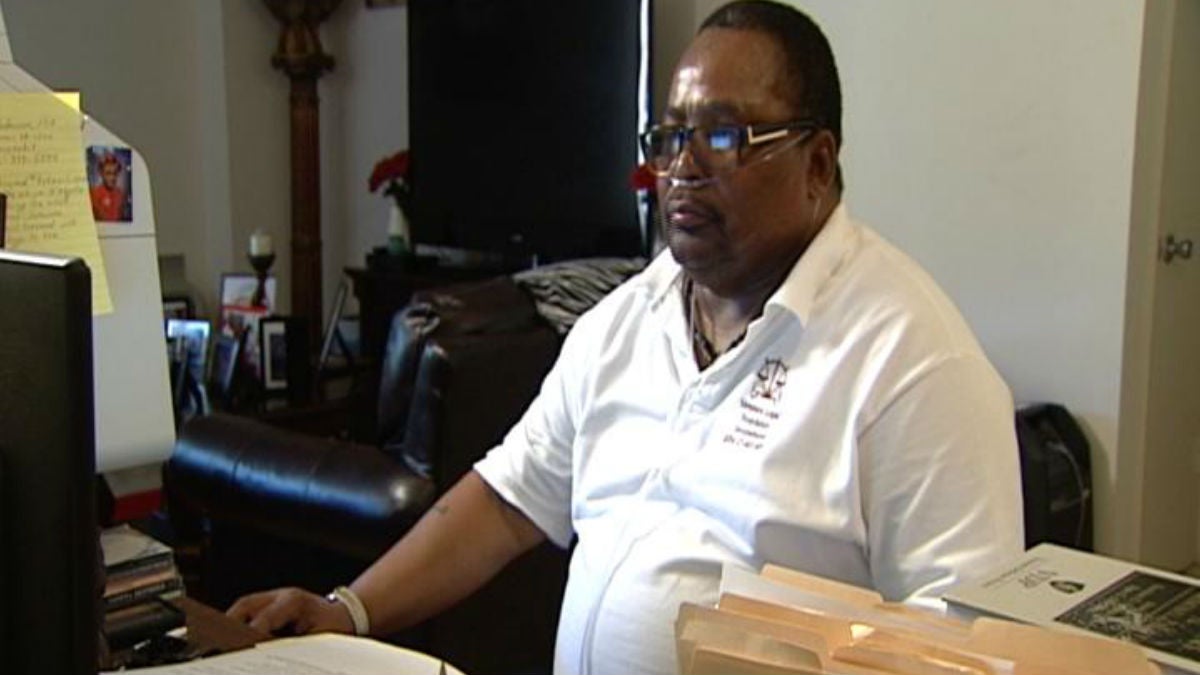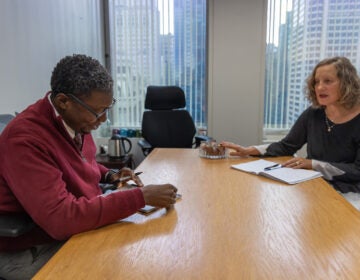For vets who end up in prison, military service doesn’t always lead to good jobs
Listen
Melvin Dill has made it his goal to help veterans currently in prison - some for life- through his nonprofit
Shaff Randolph went to prison in 2008. He says his crime was less of a misstep and more the result of a bad environment.
He had hoped serving in a skill-building, non-combat roles would become his ticket out of a rough neighborhood, or an alternative to college.
But some veterans, like Randolph, say that experience didn’t translate back into their old lives — leaving them to explain gaps in employment to civilian bosses and vulnerable to committing economic crimes.
“After completing the service, there wasn’t no real jobs for the trade that they taught me,” he said.
According to reports by the U.S. Department of Justice, veterans make up less than 10 percent of all inmates in the United States — and what those veteran inmates did in the military doesn’t seem to matter. According to the Department of Justice report, two-thirds to three-quarters of veterans in prison or jail did not serve in combat roles, similar to the breakdown of non-combat posts in the Armed Forces.
A way to grow
Randolph, who is from Philadelphia’s Logan section, spent four years on a United States Navy aircraft carrier, working as an electrician who serviced fighter jets.
After receiving an honorable discharge, he said went to Philadelphia International Airport to see what it would take to get hired on.
“They look at you and say, ‘How much experience you got?’ I can tell them, four years I did it, but they want certification for that,” he said. “You don’t get no type of certification.”
The Armed Forces do market military experience as a stepping stone to a career, but in Randolph’s case he needed over 1,000 hours of additional training to work in the private sector.
Randolph, who had no criminal record prior to serving, said school was not in the cards for him.
After the service, he worked odd jobs but never fell into steady work. Over 10 years, he accumulated a few small drug charges before landing in prison in 2008. He served eight years for possession of a controlled substance with intent to sell, and carrying a firearm while selling drugs.
Familiar story
Like Randolph, veteran Bill Cobb hoped more doors would open for him after he served in the military.
“I had no intentions of ever joining the military but as I felt my options for doing something to escape the inevitable outcomes that most people in my neighborhood are forced to deal with, I enlisted in the Air Force,” he said.
At 20, while working part-time and taking classes at La Salle University, he signed up for the Air Force reserves. A few months later, his unit was called up to serve in Germany.
For Cobb, whose family had been homeless for part of his childhood and who was struggling to put himself through school, the service was a huge departure from the life he knew.
“It was the most serious job that I ever had. It was the most structured job than I ever had. It was an opportunity to make the more money than I ever had,” he said.
Cobb wanted to be a nurse and so worked as a medical specialist at a M.A.S.H. unit, unloading hundreds of patients from C-130s aircraft carrying wounded from Iraqi battlefields. He was quickly promoted to head of a small team.
“It felt really good to be a leader and I took it seriously,” he said.
That flush of responsibility and leadership ended when his unit deactivated after a few months. Cobb went back to school and his part-time jobs, including one as a delivery man.
When he got his first paycheck, disappointment set in when he realized his co-workers were making much more than he was.
“Dude, I went away for war. That’s not fair. I want a promotion, I want to be where my friends are. I can’t help that I got sent to war,” he said,
While he was serving in the military, some of his co-workers had put in enough time to earn full-time, union jobs. But for Cobb, the clock had stopped running.
Cobb describes the next period as stressful and aimless. He was in school, working and trying to take care of his alcoholic mother with his part-time earnings.
Hoping to make a quick windfall, he agreed to be the driver for a local drug dealer who was planning to kidnap a rival’s girlfriend.
And they got caught. He said his friends — both in and outside of the armed services — couldn’t believe it.
“‘What the hell happened?’ “What are you doing?’ ‘How are you here?’ Realizing how incredibly stupid — it was just a horrible series of decisions,” he said. Cobb, who had no previous criminal record and spent six years in prison.
‘Prison life got me more ready for society than the service.’
Both Cobb and Randolph were convicted of felonies they committed after serving in the Armed Forces. Both also say they could have done a better job taking advantage of military benefits after service, like money to pay for school.
For his part, Randolph said he joined the Navy because he knew college would not be a good fit. After serving, he resented that his experience fixing jets wasn’t recognized outside the military.
“I’m bitter because I think — I thought — that when I came home from the service, I really thought that the doors was going to be open,” he said.
Randolph earned his release in April, and is taking job-training classes at the Veterans Multi-services Center in Philadelphia, a nonprofit that helps veterans of all stripes reintegrate into society.
“As I was in the prisons, I did learn little trades,” he said. Those trades included how to start a commercial trucking company, an idea that stuck with Randolph. After finishing his computer skills class, he plans to get a commercial driver’s license.
“It’s kind of strange to say, but I think prison life got me more ready for society than the service.”
After getting laid off twelve times when employers found out about his criminal record, Cobb became a professional advocate for ex-offenders, starting a nonprofit called Redeemed PA, aimed at ”eliminating systemic discrimination aimed at people living with arrest and convictions.”
In that role, researchers and public officials call on him to give his opinion on criminal justice policy questions, like the usefulness of criminal background checks.
Seeking justice
Cobb and Randolph both spent less than a decade behind bars and are now focused on the future.
For vets still serving time, Vietnam-era Marine Corps veteran Melvin Dill uses his position as a civilian advocate and head of Veterans’ Legal Foundation, Inc, to talk to lawmakers about lessening their sentences.
“I believe 45 or 50 years for a crime, that’s enough time,” said Dill, sitting among pictures of his family and inmates he helps in his Claymont, Delaware. “I believe treatment is much better than incarceration.
Dill received mental health treatment and a lenient sentence for a crime he committed after serving in the Marine Corps. To give other veterans the same opportunity to mend and enjoy civilian life, his organization is promoting a bill to change Pennsylvania law.
The working draft of a bill, which has received some support from state reps such as Mark Cohen (D-Philadelphia), proposes shortening time spend in prison for veterans whose war-related injuries may not have been considered during sentencing.
California, Minnesota, Illinois, and New Hampshire already have similar laws — which also make sure war-related psychological injuries count in court. Since Dill served time, many areas have instituted special veterans courts to work with veterans who commit crimes, and a handful of prisons even have their own veterans’ wings, structured like a military unit.
In addition to his lobbying work, Dill visits veterans in prison and helps them with benefits paperwork.
He’s connected around 200 veterans to services, mostly in Pennsylvania and New Jersey, so far. He sees his role as being a face and voice for veterans who are invisible to the general public.
“The reason that we help, because the veterans that we do help, that are in prison, they never got an opportunity to share their story, their real story,” he said. “Why are they locked up?”
Bill Cobb said he also feels like his service is invisible — out of necessity.
“I don’t frequently identify as a veteran. There’s a negative stigma with certain industries, like employment,” he said. “Government jobs, you get veterans preference points, But for the private sector, they don’t want to hire a ‘crazy vet.'”
What was hard with only military service on his record becomes harder when combined with a felony conviction, so Cobb said he leaves his time in the Air Force Reserves off of his resume.
Cobb and Shaff Randolph both say they are thankful for veterans’ support services now, but wish that their time in uniform stood for more in their neighborhoods — and with employers — after they served.
WHYY is your source for fact-based, in-depth journalism and information. As a nonprofit organization, we rely on financial support from readers like you. Please give today.




